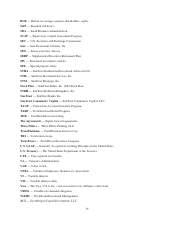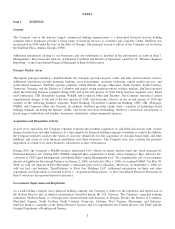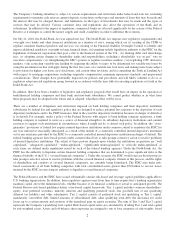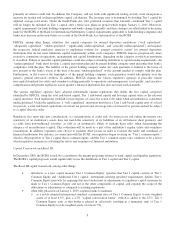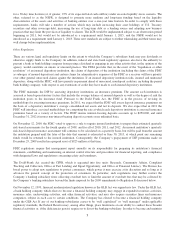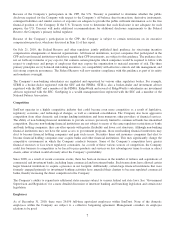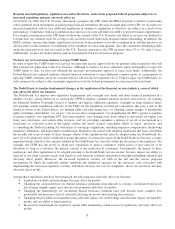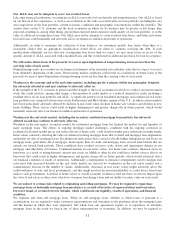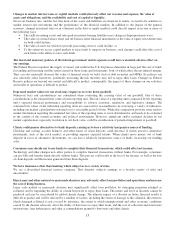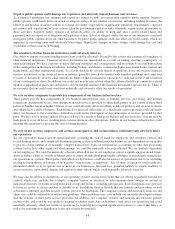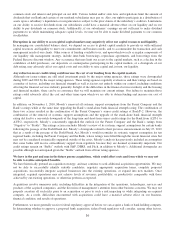SunTrust 2010 Annual Report Download - page 23
Download and view the complete annual report
Please find page 23 of the 2010 SunTrust annual report below. You can navigate through the pages in the report by either clicking on the pages listed below, or by using the keyword search tool below to find specific information within the annual report.Because of the Company’s participation in the CPP, the U.S. Treasury is permitted to determine whether the public
disclosure required for the Company with respect to the Company’s off-balance sheet transactions, derivative instruments,
contingent liabilities and similar sources of exposure are adequate to provide the public sufficient information as to the true
financial position of the Company. If the U.S. Treasury were to determine that such disclosure is not adequate for such
purpose, the U.S. Treasury will make additional recommendations for additional disclosure requirements to the Federal
Reserve, the Company’s primary federal regulator.
Because of the Company’s participation in the CPP, the Company is subject to certain restrictions on its executive
compensation practices, which are discussed in Item 11 of this report.
On July 21, 2010, the Federal Reserve and other regulators jointly published final guidance for structuring incentive
compensation arrangements at financial organizations. All financial institutions, not just companies that participated in the
CPP and even financial institutions which have repaid their CPP investments, are subject to this guidance. The guidance does
not set forth any formulas or pay caps for, but contains certain principles which companies would be required to follow with
respect to employees and groups of employees that may expose the organization to material amounts of risk. The three
primary principles are (i) balanced risk-taking incentives, (ii) compatibility with effective controls and risk management, and
(iii) strong corporate governance. The Federal Reserve will now monitor compliance with this guidance as part of its safety
and soundness oversight.
The Company’s non-banking subsidiaries are regulated and supervised by various other regulatory bodies. For example,
STRH is a broker-dealer registered with the SEC and the FINRA. STIS is also a broker-dealer and investment adviser
registered with the SEC and a member of the FINRA. RidgeWorth and several of RidgeWorth’s subsidiaries are investment
advisers registered with the SEC. GenSpring is a wealth management firm registered with the SEC and a member of the
National Futures Association.
Competition
SunTrust operates in a highly competitive industry that could become even more competitive as a result of legislative,
regulatory, economic, and technological changes, as well as continued consolidation. The Company also faces aggressive
competition from other domestic and foreign lending institutions and from numerous other providers of financial services.
The ability of non-banking financial institutions to provide services previously limited to commercial banks has intensified
competition. Because non-banking financial institutions are not subject to many of the same regulatory restrictions as banks
and bank holding companies, they can often operate with greater flexibility and lower cost structures. Although non-banking
financial institutions may not have the same access to government programs, those non-banking financial institutions may
elect to become financial holding companies and gain such access. Securities firms and insurance companies that elect to
become financial holding companies may acquire banks and other financial institutions. This may significantly change the
competitive environment in which the Company conducts business. Some of the Company’s competitors have greater
financial resources or face fewer regulatory constraints. As a result of these various sources of competition, the Company
could lose business to competitors or be forced to price products and services on less advantageous terms to retain or attract
clients, either of which would adversely affect the Company’s profitability.
Since 2008, as a result of recent economic events, there has been an increase in the number of failures and acquisitions of
commercial and investment banks, including large commercial and investment banks. Such transactions have allowed certain
larger financial institutions to acquire a presence in our footprint. Additionally, certain large financial institutions that were
formerly engaged primarily in investment banking activities have amended their charters to become regulated commercial
banks, thereby increasing the direct competitors to the Company.
The Company’s ability to expand into additional states remains subject to various federal and state laws. See “Government
Supervision and Regulation” for a more detailed discussion of interstate banking and branching legislation and certain state
legislation.
Employees
As of December 31, 2010, there were 29,056 full-time equivalent employees within SunTrust. None of the domestic
employees within the Company are subject to a collective bargaining agreement. Management considers its employee
relations to be good.
7





